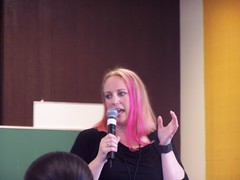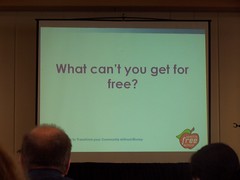 [Blog post written by Elliot Harmon and cross-posted on TechSoup Blog]
[Blog post written by Elliot Harmon and cross-posted on TechSoup Blog]
One thing I always enjoy about Craigslist Foundation Boot Camp is getting to know very small organizations. A lot of people stopped by our booth and told us about the challenges their one-or-two-person nonprofits are facing. It’s an important perspective, and a big part of TechSoup’s user base. Working with a tiny staff and budget brings a litany of challenges, but it brings some amazing opportunities too.
The low-budget ethos is encapsulated no better than in the Seattle Free School. SFS doesn’t accept donations and doesn’t apply for grants. Volunteers teach free classes in rooms donated by other local organizations. In two and a half years, SFS has grown from a simple idea into an impressive institution, with classes in topics ranging from crochet to Linux installation to getting Irish citizenship.
Founder Jessica Dally came down from Seattle to give a talk called Run Free: How to Transform Your Community Without Money. (Jessica is also a Nonprofit Commons member and NetSquared Local organizer.) In a one-hour presentation, Jessica took on the daunting task of convincing a room full of people trying to start and grow nonprofits to consider a no-budget model. She started with a simple question: What do you need to start an organization? People called out various budget items (a space, computers, staff, telephones) as well as intangibles (attention, a mission, passion). Next, she asked which items from the list you can’t get for free. We selected a handful of items from the list — publicity, computers, space, and a few others — and for each item we came up with, Jessica explained how SFS had gotten it for free or made do without it.
 Publicity? Jessica explained that when she first started SFS, she’d spend a lot of money and time printing flyers and taking them to community centers and coffeeshops around Seattle. One day she realized that there was no way she’d get the fliers everywhere in Seattle; why not crowdsource the job? Now, she posts the flyers on Twitter and Facebook, asking followers to bring them to their own neighborhood spots. “It’s just one copy. You can even print it off at work if you don’t tell anyone,” she joked. But the publicity hasn’t stopped there. A no-budget organization is a compelling story, and it gets SFS a lot of publicity. The school has been featured in every major publication in Seattle, and many of those have been cover stories.
Publicity? Jessica explained that when she first started SFS, she’d spend a lot of money and time printing flyers and taking them to community centers and coffeeshops around Seattle. One day she realized that there was no way she’d get the fliers everywhere in Seattle; why not crowdsource the job? Now, she posts the flyers on Twitter and Facebook, asking followers to bring them to their own neighborhood spots. “It’s just one copy. You can even print it off at work if you don’t tell anyone,” she joked. But the publicity hasn’t stopped there. A no-budget organization is a compelling story, and it gets SFS a lot of publicity. The school has been featured in every major publication in Seattle, and many of those have been cover stories.
Computers? Jessica and the people who work with her use their own personal computers. This one gives me a small case of jitters: it’s become increasingly common for nonprofit staff to use their own computers at least some of the time, and that’s fine if it’s an understanding that all parties are comfortable with. For any organization doing this, I’d strongly recommend that you use remote backup tools and/or online collaboration tools like Google Docs, Zoho or Microsoft Office Web Apps.
Phones? Jessica explained that at first, she simply put her mobile phone number on SFS’s website. Once she started getting enough calls that it became a problem, she switched to Google Voice. That kind of ad hoc decision-making was a major theme in Jessica’s talk: you don’t need the fancy solution right away; just use the simplest solution that’ll work until it stops working.
Space? SFS began by holding all of its classes in meeting rooms at the library. But as the school got more attention, local organizations started actively courting SFS to hold classes at their offices, with the idea that it was good marketing for them. If SFS were a traditional nonprofit, it’s possible that other local organizations with their own budgetary woes wouldn’t have been so generous.
Finally, someone asked, “How do you support yourself?” Some were bemused by Jessica’s matter-of-fact reply, “I have a day job. Actually, I have three day jobs.” She said that she works about ten hours a week month for SFS, but that those ten hours are all spent on programs, not on fundraising and accounting. When I interviewed NOZA founder Craig Harris a few years ago, he told me that when people start nonprofits, they’re invariably surprised to learn that regardless of what the organization does, they’ll be spending most of their time fundraising. Looking at it that way, there’s something to say for foregoing the fundraising and just getting a day job.
Does a no-budget model make sense for every organization? Maybe not. But we can all learn something from organizations like the Seattle Free School about finding creative solutions and relying on our communities.
Update: See Jessica’s notes in the comments thread.
Microsoft and NOZA are TechSoup product donation partners.
…………………………………………………
Discuss This in Our Forums
What are the advantages of operating with no money? What are the drawbacks? What’s your secret to running your nonprofit on the cheap? Join this Emerging Technologies forum discussion.
Written by: penguin kuhn

